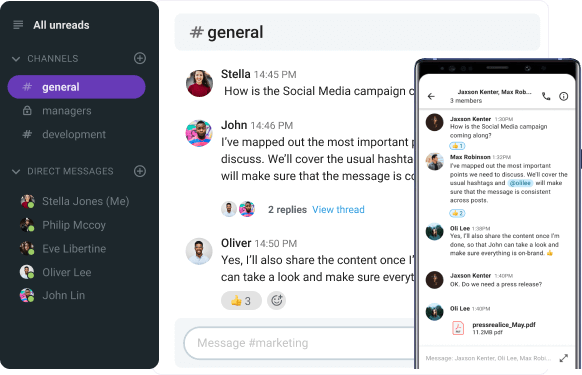There are hardly any words to describe how losing someone dear feels. Nothing compares to the pain and trauma the death of a loved one causes.
When this horrible scenario hits us, we’ll hopefully have at least a few people around us to empathize and try to relieve our pain with kind words and thoughtful gestures.
And, most often, not one of these people will expect anything in return from us during these times.
But, what about people at work? Sure, no one will take offense if you remain silent or forget to respond during these difficult times. It’s completely understandable to leave a few messages unanswered or just like the ‘Sorry for your loss’ message from a coworker when you’re feeling overwhelmed with grief.
Still, if you want to uphold the (unwritten) business communication etiquette, you can find it in you to respond to “Sorry for your loss” messages professionally.
In this article, we will give you 40 examples of how to reply to ‘Sorry for your loss’ at work, so you don’t have to worry whether you’re saying the right thing during grieving.
Let’s get started.

- Example of how to respond to ‘Sorry for your loss’ formally: “I appreciate your condolences.”
- Example of how to respond to ‘Sorry for your loss’ from a work friend: “Thank you. Your words and support mean the world during this time.”
- Example of how to respond to ‘Sorry for your loss’ from a coworker you don’t know so well: “Thank you for the message. I appreciate your comforting words.”
- Example of how to respond to ‘Sorry for your loss’ from people from your team (as a boss): “Thank you. It’s comforting to know I have such a supportive team around me.”
- Example of how to respond to ‘Sorry for your loss’ for the loss of a parent: “Our family appreciates your kind words.”
- Example of how to respond to ‘Sorry for your loss’ for the death of a spouse: “I was lucky to be able to share my life with them.”
Table of Contents
How to respond to “Sorry for your loss” at work
Wondering how to respond to condolences at work without having to repeat “Thank you” for the 100th time?
Before we get to specific scenarios of responding to condolences at work, here are some (more or less) generally applicable examples you can use as an appropriate reply to “Sorry for your loss”:
“I appreciate your thoughts and kind words.”
“That means a lot during this horrible time. Thank you.”
“I appreciate your support. It’s been a tough time.”
“Thank you for coming.”
“Thank you for reaching out.”
“[The deceased] thought highly of you.”
“I’m grateful for all the thoughtful gestures and words I’ve been receiving.”
“Thank you. [The name of the deceased] admired you.”
“I appreciate you being here for me.”
“Thank you. It’s been difficult, but we’re making it. We’re taking it day by day.”
_______
Now let’s help you pick the appropriate reply to “Sorry for your loss” in different specific situations at work.
How to respond to condolences in person
Most often, people at work will say something generic such as “sorry for your loss” upon seeing the person who lost someone recently.
Although there’s nothing ostensibly wrong with this phrasing, it can come across as impersonal and it’s often said to someone you don’t know so well.
The entire exchange might make you feel uncomfortable and unsure of how to respond.
Here are some examples to help you come up with a response to “sorry for your loss” in person:
“Thank you. I really appreciate that.”
“Thank you for coming.”
“That means a lot during this horrible time. Thank you.”
“I appreciate the kind words.”
“Thank you. It’s been difficult. We’re taking it one day at a time.”
_______
💡 Pumble Pro Tip
Being in a position to receive solace from the words people offer in their condolence messages makes you even more aware of the importance of our choice of words. This is especially true in the workplace context. Corporate jargon and popular overused buzzwords most certainly have no place in condolence messages. To learn more about what to avoid in corporate communication, as well as what to use as an alternative, take a look at our guide on the blog:
How to respond to “Sorry for your loss” formally
If you need a more formal response to condolences at work, here are some examples that can help you craft a note to coworkers, bosses, or clients and thank them for their support during this time.
“I appreciate your condolences.”
“I would like to express my gratitude to the entire team at [company name]. Our family appreciates the kind words.”
“Thank you very much. I’m very grateful for such supportive and caring coworkers.”
“Your support and understanding means very much during these difficult times.”
“Thank you very much for your kind words. I really appreciate your patience and understanding during my absence. It means a lot to know we have a great and supportive team who can cover for each other during a tough period.”
Here’s an example of how this exchange can look in a team communication app Pumble.

💡 Pumble Pro Tip
To keep your response concise, professional, and clear, you can visit our guide on the blog and brush up on your work message skills:
How to respond to “Sorry for your loss” from a work friend
If you’re lucky, you’ve established some amazing relationships with at least a few of your coworkers, and you’re proud to call some of them your friends.
When you experience a loss, these will be some of the first people to reach out just to check in on you, express their condolences, and ask how they can help.
And when they do, here’s how you can respond:
“Thank you so much. [The name of the deceased] admired you.”
“Thank you. Your words and support mean the world during this time.”
“I appreciate you being here for me. Don’t know what I would do without you.”
“I’m so thankful for having you as a friend. I love you.”
“Thank you so much. It’s so comforting knowing I can turn to you in my time of need.”

💡 Pumble Pro Tip
To learn more about expressing empathy in the workplace, be sure to visit our guide on the blog:
How to reply to “Sorry for your loss” from a coworker you don’t know so well
Except for a few friendships you may develop at work, in most cases, you won’t necessarily be so close with your coworkers.
Still, you can expect that they will reach out to you in your moments of grief and express their condolences. These messages will likely be a bit more concise and less personal.
So, you can prepare similar replies.
Here are some examples:
“I appreciate your thoughts and kind words.”
“Thank you for reaching out.”
“I appreciate your support. It’s been a tough time.”
“Thank you [coworker’s name]. Your support and thoughtfulness are well received.”
“Thank you for the message. I appreciate your comforting words.”

How to reply to condolences from people from your team (as a boss)
As a team leader, your relationship with your team is pretty much dependent on your leadership style.
If you lean toward a more empathetic leadership style, chances are your teammates will feel more comfortable sending heartfelt condolence messages.
On the other hand, if you practice some of the more traditional styles of leadership (e.g., structural), you’ll probably be more in favor of formal communication in the workplace.
Your teams’ condolence messages and your replies will also most likely follow your commonly practiced communication style.
Still, regardless of your preferred communication style, your team will surely do their best to craft encouraging and sympathetic messages to show their support during your mourning.
Take a look at our examples below to get an idea of how to ensure your reply communicates appreciation while still maintaining the subtle boundaries present between your roles in the workplace.
“Thank you very much. I’m grateful for all the support I’ve been receiving.”
“I appreciate your support during this difficult time.”
“Thank you. It’s comforting to know I have such a supportive team around me.”
“I would like to offer my appreciation for the entire team at [your company]. I’m grateful we have such an amazing team I can trust to make the right decisions in my absence.”
“Thank you for the kind words. I will let you know the date I plan to return to work.”

How to respond to condolences for the loss of a parent
Losing a parent in adulthood causes great suffering coupled with some specific developmental shifts that often occur in parentally bereaved adults.
According to the literature on reactions to different types of bereavement, in addition to regular grieving people who suffered losing a parent feel, they are also very likely to experience the so-called “developmental push”, propelling them to a more mature role and a proper adult identity.
While you’re going through one of the harshest moments in your life, people around you will most likely try to make you feel cared for and supported.
Responding to condolence messages and offers to help in any way possible will become a part of your regular daily routine during this period.
So, if you’re not sure how to respond when people from work send condolences when you’ve suffered the death of a parent, take a look at our examples:
“I appreciate the support.”
“Our family appreciates your kind words.”
“Thank you. I’m so grateful that my entire family was there at the end.”
“Thank you very much. We hope to see you at the memorial if you’re able to come.”
“Thank you for being here for us. I will let you know all the service details as soon as we make the final arrangements.”

How to reply to “Sorry for your loss” for the death of a spouse
A study on the emotional and health impact of losing a loved one by The National Academy of Medicine (NAM) — Bereavement: Reactions, Consequences, And Care — states that losing a partner causes some of the biggest grief in people’s lives.
If you happen to experience this terrible loss, you’ll hopefully have plenty of support and resources to help you cope.
People you work with are going to be among those reaching out to express their sympathy for your loss.
Here are some ways you can respond:
“Thank you. It’s been tough, but I’m getting by.”
“I was lucky to be able to share my life with them.”
“[The deceased] thought highly of you.”
“Thank you. It’s been rough, so that means a lot.”
“I appreciate that. I know they are in a better place now.”

How to reply to condolences when you’ve lost a sibling
Losing a sibling is another one of the greatest traumas we can experience in our lives. There are hardly any words that could relieve our pain and suffering during such a horrible loss.
Still, it’s important to thank people around you for their support and caring words. This includes people you work with who will send their condolences.
Here are some ways you can reply to “Sorry for your loss” at work when you’ve lost a sibling:
“Thank you. I’m at a loss for words.”
“I feel honored to have been their brother/sister.”
“Thank you. Your words are truly helping me during this time.”
“I would like to thank everyone from the team who sent kind messages. Your words are truly appreciated.”
“Thank you for finding the right words to say. It’s really helpful. I know it’s not the easiest thing to do.”

What to say when someone says “Sorry for your loss” for the death of a pet
Unfortunately, most pets don’t live nearly as long as they should or as we would want them to. This makes it almost inevitable to experience the tragedy of losing a pet at least once in our lifetime.
While you’re coping with this profound sadness, condolences and words of sympathy from dear people and work colleagues may offer some solace.
Take a look at the examples of how to respond to condolences at work for the loss of a pet:
“Thank you so much. I know you understand what I’m going through.”
“Thank you for your condolences.”
“Thanks. It’s comforting to know [name of the pet] is in a better place.”
“[Name of the pet’s] memories will always be with us.”
“Thank you. [Name of the pet] has brought immense joy and unconditional love to our lives.”

💡 Pumble Pro Tip
Although comforting, words and condolence messages are not always going to provide the optimum support you might need during a difficult period after losing someone dear. As a result, your mental health may suffer a severe decline if you fail to properly address the difficult emotions you’re dealing with. To find more resources and support both in and outside the workplace, check out the tips provided in this blog post:
“Sorry for your loss” replies: Thank them for their support
Suffering a loss is one of the most challenging life events we’ll ever experience. This is why it’s important to stay mindful and grateful for all the support and care offered during these terrible times.
A simple “Thank you” is more than enough in most cases. However, if you want to add something more personal to your reply to condolences, you can use our examples above.
Still, remember to take it easy during your mourning and not put additional pressure on yourself to make others around you feel appreciated and comfortable up to the point of disregarding your needs.




